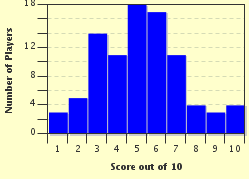Quiz Answer Key and Fun Facts
1. We'll start with the first recorded invasion. The Mongol Empire is well known for its incredible expansion through most of Asia and parts of Europe. Russia was no exception. Name the leader who successfully invaded in 1237 and held all of Russia under his sway by 1242.
2. The 1240s really were a rough period in Russian history. The Principality of Novgorod actually faced both Mongol siege, as well as a Swedish invasion. While ultimately surrendering to the Mongol horde, they first managed to repel the Swedish invaders in a battle on which river in 1240?
3. Moving forward nearly 400 years, we arrive in the early 1600s, during a period of Russian history known as "The Time of Troubles." It was during this period that the Rus Dynasty, the first dynasty to unite Russia under a single banner, ended, and a period of civil wars and political intrigues plagued the nation. The Polish-Lithuanian Commonwealth took this opportunity to invade in 1609, and forced Russia to find new allies. With which country did the Russians form an alliance to fight off the Polish invaders?
4. Sometimes, invasions come as the result of a nation's own actions. Sweden invaded Russia in 1707. This was a direct result of Russia invading Swedish territories on the Baltic, as part of a larger offensive contrived with assistance from Denmark and Poland. Who led the Russian forces?
5. After subduing Russia's allies, Sweden began to work its way into modern-day Ukraine. The Russian armies withdrew slowly, fighting only when necessary. But they did not simply withdraw. What tactic, employed by numerous forces, most memorably by William Sherman during the American Civil War, did he use to hamstring the Swedish Army?
6. Perhaps the most famous instance of invasion into Russia is that of Napoleon and the French. The campaign is known by several names including "The Second Polish War" and "The Russian Campaign", but what did the Russians call it?
7. The first major confrontation between the French and Russian armies occurred at Borodino, about 70 miles southwest of Moscow. The Russian army put up rushed defensive positions and prepared for the onslaught. The strongest point of defense was a fortification known as what?
8. Napoleon made it to Moscow with only 1/4th of the army he had set out with due to the intense weather conditions, desertions, and skirmishes with the Russians. He was quite surprised when he got there, as the city was almost completely deserted. As his troops rushed to find supplies and shelter, what catastrophe put an end to Napoleon's dream of conquering Russia?
9. The most recent attempt at taking over Russia came during World War 2. Hitler massed an enormous invasion force of over four million troops that began marching in an offensive code-named what?
10. Leningrad (St. Petersburg) was under siege for over 2 years during WWII. What percentage of the population had survived by the time the siege ended?
Source: Author
klinski_1987
This quiz was reviewed by FunTrivia editor
bloomsby before going online.
Any errors found in FunTrivia content are routinely corrected through our feedback system.

